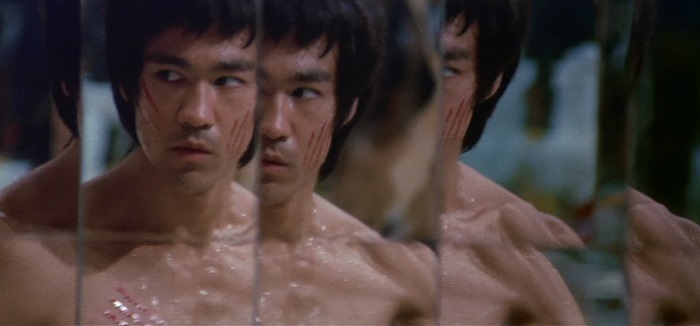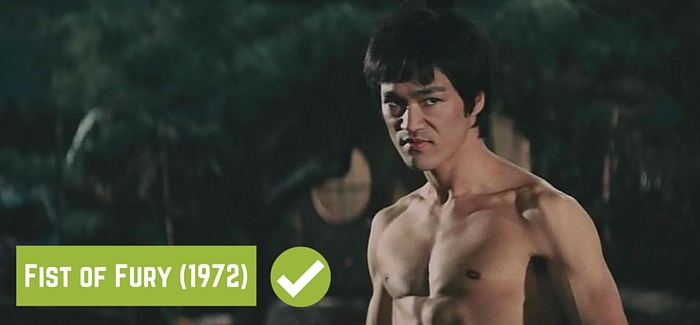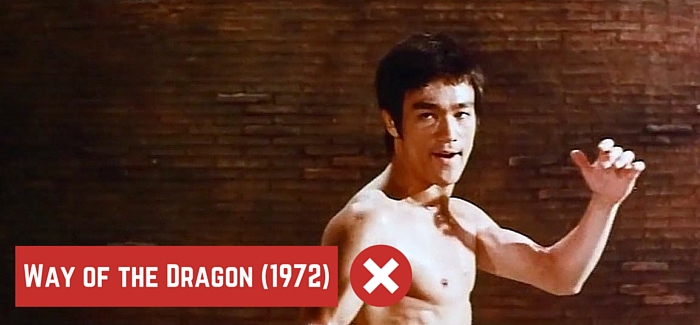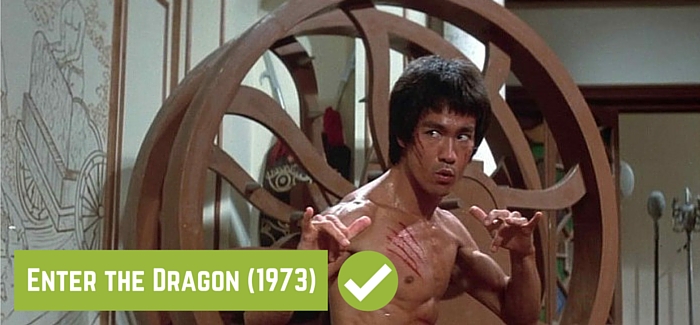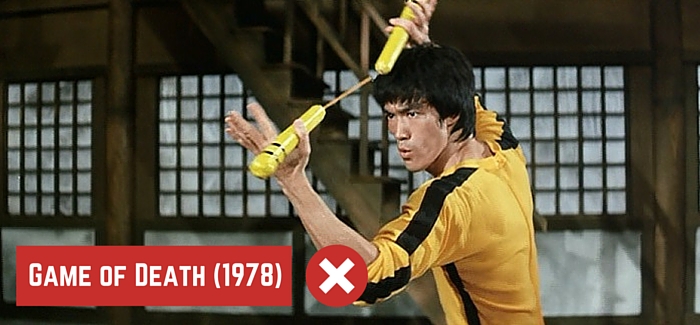|
If the exhibition on Bruce Lee's life at the Hong Kong Heritage Museum demonstrates one thing, it is the huge amount Lee achieved during a cruelly short but incredibly productive life. While his reputation rests mainly on the four martial arts films he completed as an adult, he had a notable career as a child actor in Hong Kong during the 1950s. Significantly, he appeared in In The Face of Demolition (1953), which was listed as the 18th greatest film in the history of Chinese cinema at the Hong Kong Film Awards in 2005. Today, most fans of Asian action cinema surely have all of Lee's martial arts films in their collection. Since coming back from Hong Kong, I've been revisiting those films and have decided that for me personally, only three make the cut. If only those three films existed, I really think that Lee's legacy would be almost exactly as strong as it is today. Moreover, those three films chart a logical progression in Lee's abilities, demonstrating the vast potential which was cut short by his untimely death in 1973. By looking at Lee's films in turn, I'll explain why I think that Lee's legend was made not in five films or even four, but just three. The Big Boss (1971) [HKMDB] Directed by Lo Wei Co-starring James Tien, Maria Yi, Han Ying-chieh Lee is generally said to have been quite dejected when he returned to Hong Kong to make a film with fledgling studio Golden Harvest. His attempts to become an international star based in Hollywood had been dashed, not least by the studios' inability to envisage an Asian leading man. The Big Boss was hardly a prestigious production – the original director complained of the low budget and walked away, and established star James Tien was originally to be the focus of the story. Known to Hong Kongers for his sidekick role in what they knew as The Kato Show (the American series The Green Hornet), Lee was essentially parachuted into a pretty standard martial arts pot-boiler, and it showed in the low production values. However, The Big Boss succeeds. Lee's growing acting experience, charisma and sheer fighting prowess shine through immediately, and overcome Lo Wei's workmanlike direction and the overly simple story. The inspired decision to have James Tien handle the early fighting ratchets up the tension so that when Lee is finally unleashed in the final act, the impact is as dramatic as possible. Hong Kong audiences had seen plenty of films like The Big Boss before, but nothing like Bruce Lee. It's hardly surprising that the film exploded box-office records in the territory upon its release in October 1971. Fist of Fury (1972) [HKMDB] Directed by Lo Wei Co-starring Nora Miao, Riki Hashimoto, Robert Baker Buoyed by the unprecedented success of The Big Boss, Golden Harvest reunited Lee and Lo Wei for their second and final collaboration, Fist of Fury. This second production is a huge step up from the first in every respect: production standards were quite lavish for the time, the story is far superior, and Lee's abilities had once again grown rapidly. The film is also by far the most complex of Lee's works in terms of ideas. Fist of Fury is essentially a martial arts tragedy with heavy themes of colonialism, nationalism and race which have generated a lot of discussion over the years and are sometimes controversial. While the plotting can be somewhat laboured, the film is a key part of Lee's legacy not only due to its superb fight scenes in which he takes on Japanese martial arts practitioners, but also his portrayal of Chen Zhen. The character is far from entirely sympathetic, and arguably causes as much of the film's tragedy as he avenges. While a creation of the film, Chen Zhen has become something of a cinematic folk hero in his own right and has since been played by martial arts superstars Jet Li and Donnie Yen. Fist of Fury once again chimed with Hong Kong audiences and again smashed box-office records both there and across much of Asia. Way of the Dragon (1972) [HKMDB] Directed by Bruce Lee Co-starring Nora Miao, Chuck Norris, Robert Wall I couldn't disagree more with the quite sizeable number of people who rank Way of the Dragon as Lee's best film. Released only around nine months after Fist of Fury, the film was written and directed by Lee himself and was a co-production between Lee's own Concord Production Inc. and Golden Harvest. A frankly disastrous attempt to create an international martial arts comedy, Way of the Dragon is for my money by far the most inept of Lee's completed films and has nothing to offer outside of its fight scenes – which themselves are greatly overrated. Personally, I think Lee was rather over-eager to get into the director's chair but the faults with the film lie more in Lee's abilities as a writer. The film's attempts at humour simply don't work and come across as demeaning, and there isn't so much as a single fully realised character in the talky, uneventful script. There are a host of distracting technical issues, and the much-lauded climactic fight with Chuck Norris set in Rome's Coliseum is shot on a very poor stage at Golden Harvest. The suggestion that this stop-start affair is the greatest fight scene of all time is a huge stretch – not least because the battle is leant no tension or significance by the mess of a film which precedes it. Enter the Dragon (1973) [HKMDB] Directed by Robert Clouse Co-starring John Saxon, Jim Kelly, Shih Kien There is no doubt that Enter the Dragon has done more for Bruce Lee's international reputation than any other film on which he worked. Originally known as Blood and Steel, this groundbreaking US-Hong Kong co-production had a somewhat tortured gestation but emerged as one of the most accomplished martial arts films of all time, and certainly one of the more accessible. Much credit has to go to writer Michael Allin – despite admitting he knew nothing of martial arts or Hong Kong, he crafted an excellent script full of philosophical insight and memorable lines. Although he has some capable American co-stars in the form of John Saxon and Jim Kelly, Bruce Lee still dominates Enter the Dragon. By 1973 his screen charisma was at its peak and he is immensely watchable in every scene. The fact that Lee was nervous as production began is never evident in the stunning fight sequences, particularly the devastatingly brutal cavern fight (in which a young Jackie Chan appears briefly, as he had done in Fist of Fury) and the legendary “hall of mirrors” battle against veteran HK actor Shih Kien. Representing the peak of Lee's dramatic and fighting abilities, Enter the Dragon is a fitting legacy. Game of Death (1978) [HKMDB] Directed by Robert Clouse Co-starring Gig Young, Dean Jagger, Colleen Camp Enter the Dragon director Robert Clouse perpetrated one of the most infamous acts of cinematic necromancy when he salvaged barely eleven minutes of Lee's unfinished film Game of Death (which he shelved before filming Enter the Dragon) into a maligned 1978 release. There aren't too many films I'd go out of my way to avoid seeing, but Game of Death is one. This cruel, opportunistic misuse of Lee's legacy even went as far as to use footage of the great man's real-life funeral. In 2000, the impressive documentary Bruce Lee: A Warrior's Journey was released – it contains a substantial portion of Lee's original footage, separated from any slapdash attempts to force it into a real story. To my mind, the 1978 version simply shouldn't be regarded as part of Lee's filmography, and it is a shame that it continues to be re-released as if it was a real film in its own right as opposed to what it is: the beginning of the cash-in Bruceploitation trend. A Note on UK Home Video Releases
For a long time, collecting high-quality releases of Bruce Lee's films has been quite a challenge in the UK. Some years ago, the now-defunct Hong Kong Legends label released all of the films except Enter the Dragon on Region 2 DVD; multiple subsequent releases have been based on those discs including a more recent set by Entertainment One. Because it was distributed by Warner Bros., Enter the Dragon has been well-served on UK home video. I have a copy of the steelbook Blu Ray release which is well worth picking up – an alternative is the slightly more elaborate 40th Anniversary Edition released in 2013. The other four films had never been available on Blu Ray in the UK until 2015, when Mediumrare Entertainment finally released all of them in dual DVD / Blu Ray sets. While I personally think the new cover artwork is very poor and the 24-page booklets are a bit crude, from what I have seen the actual discs are excellent. Many of the features are carried over from the old Hong Kong Legends releases, but each disc has new items including commentaries from Mike Leeder. There's a full rundown of features available over at City on Fire.
0 Comments
Your comment will be posted after it is approved.
Leave a Reply. |
About
Exploring classic science fiction, with a focus on the 1950s to the 1990s. Also contributing to Entertainium, where I regularly review new games. Categories
All
|
